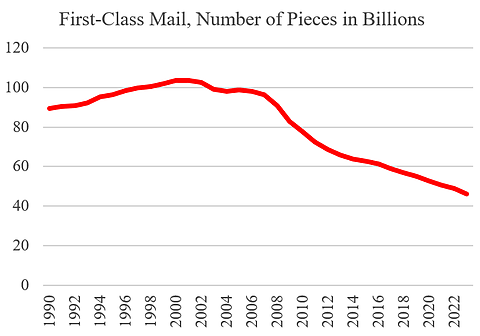Chris Edwards
“President-elect Donald Trump has expressed a keen interest in privatizing the US Postal Service [USPS] in recent weeks,” reports the Washington Post. The article discusses Trump’s long-standing complaints about the postal agency and possible reforms in the spirit of his Department of Government Efficiency (DOGE).
The article mentions hurdles to privatization, but ongoing declines in letter volume mean that the status quo is not an option. First-class mail has plunged from 104 billion pieces in 2000 to 46 billion by 2023. On a per-capita basis, 2023’s mail volume was just 37 percent of 2000’s. Congress provides the USPS with a legal monopoly over mail, but mail is a dying industry.
Few people today send personal letters; banking and bill-paying have gone online, and the internet has killed postcards, invitation notes, and other types of mail. Few young people use mail, so demography is doom for an unrestructured USPS.
The USPS has expanded into package delivery, but we already have FedEx, UPS, and Amazon competing in that industry. As a government-owned agency, USPS expansion into packages or other competitive industries is problematic because it has tax and regulatory advantages over private firms.
A Trump task force in his first term found that the USPS’s business model “is unsustainable and must be fundamentally changed.” The needed change is to privatize the postal system, a reform that European countries, such as Germany, have successfully pursued.
Privatization would give the USPS the flexibility it needs to survive free from congressional micromanagement. The first Trump administration was right that a “privatized Postal Service would have a substantially lower cost structure, be able to adapt to changing customer needs and make business decisions free from political interference, and have access to private capital markets to fund operational improvements without burdening taxpayers.”
You can see the cost structure problem with USPS retail locations. The company had 31,123 locations in 2023—about the same number as in 2014. Yet over those nine years, the number of USPS retail customer visits plunged 30 percent. The USPS should be closing locations, but members of Congress resist closings in their districts.
Whether Trump pursues privatization next year or not, he should push Congress to cut USPS costs and stem its chronic losses. Trump should push Congress to:
Close thousands of post offices that are little used or duplicative. USPS auditors found that 42 percent of post offices do not generate enough revenue to cover operating costs and that these locations “are often located within a few miles of another post office.” I nominate two locations to close near me in Northern Virginia, as shown below. Closing locations would benefit the environment and free up land for other uses, such as housing.
Loosen the universal service obligation (USO), which requires the USPS to deliver to every address six days a week at one price. That is a more expansive USO than other countries impose, and it makes no sense given the ubiquity of electronic communications. Cutting mail delivery to three days a week would slash the number of needed trucks and reduce carbon emissions.
Repeal collective bargaining for the USPS and adopt private-sector compensation standards. USPS labor rules bloat costs and reduce business flexibility.
Cutting costs is an important reform step, but the ultimate goal should be to create a level playing field for all products in postal markets. That can be achieved by privatizing the USPS, freeing it from congressional mandates, and repealing its monopoly over mail. America is brimming with innovative entrepreneurs, and we should let them take a crack at modernizing the letter industry.
More on postal reform here, here, and here.
Close These USPS Locations
In the spirit of DOGE, the USPS should create an online portal for Americans to recommend duplicative post offices to close. For most people, adding a few minutes of trip time to their once-a-month visits to the post office would be no big deal.
So USPS—please close these locations near me in Northern Virginia:
6375 Seven Corners Center, Falls Church. This location is a six-minute drive from another location on Leesburg Pike. This is a vibrant commercial strip, and so the land would be quickly put to a higher-valued retail use.
1100 Wythe St., Alexandria. This location is a four-minute drive from another location on Washington Street. The location is high-value real estate worth tens of millions of dollars, and the large parking lot is more suited to the pre-internet era. Row houses or apartments would be a better use of this land.
Closing duplicative locations would save money, benefit the environment, and release land and buildings for higher-valued uses. To his credit, Postmaster General Louis DeJoy is already pursuing such DOGE-style reforms. But Trump will need to nudge members of Congress to get on board the USPS efficiency bandwagon.


























